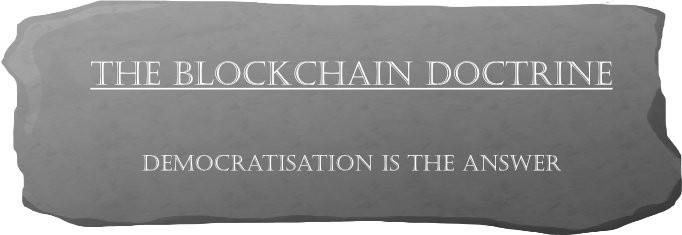
Democratisation – Is it the Answer for Blockchain?
The blockchain technology is not perfect.
In my continuing expansion of my concerns relating to the rush into Blockchain, today I consider democratisation and why I have concerns.

With blockchain there is a heavy value placed on the democratisation of the ecosystem with reliance on consensus governance i.e. no centralisation of authority. This is achieved by various mechanisms such as proof-of-work, proof-of-stake, etc and should mean that no one person or body (or small group) can determine what is and what is not correct/included/appropriate.
While it may appear superficially attractive, I see a number of problems with this.
The first is that it assumes that all users are equally (or at least sufficiently) able to look after their own interests;
-
to know what and when to buy (or sell) and not to buy (or sell);
-
to recognise a scam when they see it;
-
to understand the risks they are taking transacting on a/the blockchain;
-
To be able to monitor developments that will affect them;
Unfortunately, and I mean no offence, there are stacks of evidence to show this is not the case for much of the population – not just those currently seen as vulnerable. Financial education is a big issue and not easily solved. Understanding comes from maturity and the relevance to evolving (financial) needs. Access and speed of access is not uniform – just watch the average punter squeezed out in fast and falling markets!
While the current governance through regulators, banks, etc is not perfect and should be improved, it does in most parts embody a duty of care to users, especially the less savvy and less capable. In my opinion, Society benefits from and still needs that protection.
The second is that not all participants are equal and in fact, stories abound relating the concentration, and the related influence, relating to crypto/blockchain holdings. In recent months it has been reported that 0.01% of addresses hold almost 60% of all Bitcoins in circulation and that 10% of the miners control 90% of the mining. Of course, one can argue the statistics, but I think it is clear that Blockchain has created its own concentrations and undue abilities to influence value, etc.
My fear is a coordinated effort to take control of key systems and services, whether it be state-sponsored or simply criminal in intent.
The third harps back to my arguments about immutability in that the power and capabilities of technology continue to grow and will keep doing so. With these developments, things that are considered impossible (or at least unviable) today may well be very possible and attractive tomorrow. As such the governance of such an important capability needs to be forward-thinking and predicting and preparing for the issues of tomorrow – not just living in today. I see no such leadership across Blockchain and indeed the cry for democratisation will likely thwart efforts to create this – too many people want to be unfettered and hide behind the democratisation banner.
Lastly from me, but you may want to add more, the democratisation argument is used to justify under-engineering of key aspects of an important financial infrastructure such as monitoring, rectification of genuine errors and misunderstandings, and the duty of care I mentioned before.
The drive to develop Blockchain is seen as a technological rather than societal development with all the risks that brings.
So let’s do better, but not rush headlong into total democratisation.
Trending
-
1 How Does SaaS Differ From IaaS And PaaS?
Fabrice Beaux -
2 Single Page Applications vs Multi-Page Applications
Fabrice Beaux -
3 Top 7 Effective Strategies for Multi-Language Website Development
Fabrice Beaux -
4 Boost Engagement to Infinity and Beyond: Unleashing AI-Driven Support
Anas Bouargane -
5 The Cheapest And Most Beautiful Stickers in CS2
Daniel Hall





Comments